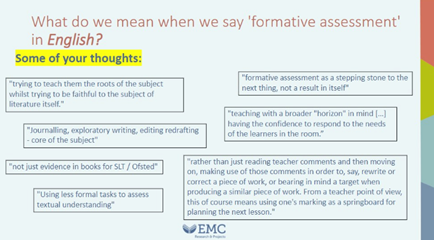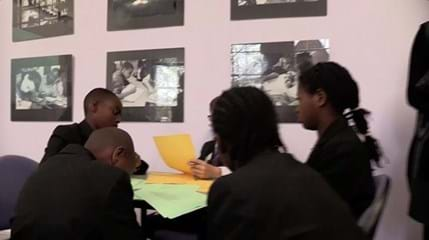One of the things I’ve been hearing, when I’ve been presenting the early outcomes of our project on group work, is ‘How wonderful! How inspiring! If only we had the time to do this kind of work!’ I am, of course, thrilled at the first part of the reaction, where teachers and other education experts clap and cheer when they see the students on our videos engaging in serious, animated and deep discussion of difficult texts. But my heart sinks at the thought that some still see this is an optional ‘extra’ rather than the very means by which they could be doing all those things they perceive themselves as having to do – preparing students for future examinations, improving students’ grades, proving that learning is happening. My contention – contentious perhaps in some spheres these days – is that preparing students for future examinations, improving students’ grades and proving that learning is happening is fulfilled much better by doing fantastic group work, and other talk-rich activities, than by eschewing it in favour of simple transmission approaches. That’s not to say that transmission is never valuable. As readers of my other blogs will know, I’m highly sceptical of any single approach, strategy, theory or directive that claims to be ‘the way’ to do it. It’s always ‘yes…and’ or ‘yes…but’ rather than a blunt, crude certainty about one approach working or not. In the right hands, with the right level of subtle thinking about how pupils are learning, all options are open – teacher instruction, modelling and talk, whole class teaching, individual work, silent writing, silent reading, noisy pair work and high quality group work. They can all provide the kind of challenge and focus to move students’ learning on, developing pupils’ knowledge, skills, confidence and pleasure in learning in equal measure.
What can group work do for your students?
Let’s take a small example, drawing on a piece of evidence from the EMC group work project. You are working with a class of Year 7s on poetry. One long term aim is give them the confidence, knowledge and skills to be able to handle unseen poetry at GCSE, as well as writing well about set poems. You also want them to encounter a range of different poems – including perhaps canonical ones. Maybe you have a feeling that pupils don’t come across enough challenging texts, that they need to be taught ‘content’ or ‘knowledge’, that it’s important to introduce them to the kind of literature that they wouldn’t necessarily read outside of a classroom. Nothing wrong with that. A very important aim – alongside other aims, that might read a bit differently, such as introducing them to contemporary, living writing and writers, diverse texts that speak to them and their identities and allowing them to see the continuities between themselves as writers and the writing of published authors. (A bit of ‘yes and…’, rather than either/or, is going on here.) A shorter term aim might be that you want your Year 7s to start to write about poetry, beginning to take on some of the terms and ways of thinking about poetry associated with literary study, such as talking about voice, or metaphor, or rhyme and refrains.
What’s the best way of fulfilling these aims? There are many options open to you. One is to have a lesson on metaphor. ‘Today we’re going to find out about metaphors in a poem. I’m going to give you a definition of a metaphor. I’m going to give you two poems in which there are metaphors to describe a falcon. I’m going to ask you to find those metaphors and tell me about them,’ or perhaps, ‘I’m going to tell you about what the metaphors are in one poem and ask you to find them in the other one,’ or ‘I’m going to ask the whole class questions about the metaphors and along the way I’m going to tell you what I think.’ At the end of the lesson you say to yourself, ‘Good. We’ve learned about metaphors.’ You might feel quite pleased that the concept has been nailed. Next time they encounter a metaphor in a poem, they will be able to spot it. You might even ask them from time to time, ‘Where’s the metaphor?’ just to be sure that they remember.
For your short term aim, this has taken you quite a long way, you think. You can tell anyone coming into your classroom what has been achieved. The children can be tested on what a metaphor is. But what of the longer term, bigger, broader aim, of putting students into a position to be able to encounter any poem and respond to it with confidence, treating it in a way that our subject requires? This involves multiple skills and knowledge of how poetry works. Above all it means being able to test out first thoughts against more measured reflection, being able to observe patterns and identify what is significant, rather than being overwhelmed by every tiny detail. It means feeling comfortable – indeed excited by – ambiguity and complexity. It means understanding how poems work differently from prose, understanding how to read them accordingly, and discovering how multiple and various they are in the techniques they use, from figurative language (including metaphor), to sound patterning, to the look on the page. Does your ‘teaching metaphor’ lesson take you any way towards this bigger, more ambitious aim for your students?
Working with a class of Year 7s on poetry, we had this more ambitious aim in mind and we wanted to examine whether it could, in any way, be fulfilled by group work. Was group work a luxurious, fun ‘extra’, or could it be the means for doing something demanding, stimulating and significant for the students, in teaching them how poems work, what they have to offer and how to talk (and write) about them in productive and interesting ways. If our reactions, and those of teachers watching our video clips are anything to go by, then the answer is a resounding yes. The students worked in groups. They discussed two demanding poems, one poem per group, supported by a list of statements to debate which put forward some ideas about the poems and how they worked, thematically, stylistically, in relation to voice and other aspects of the poetry. The pupils re-grouped to present their poems to each other and looked for points of similarity and difference. There was no teacher input, apart from to direct the ways in which they talked from time to time, encouraging them to subject their thinking to serious scrutiny, to consider alternative possibilities and prove their thinking to themselves.
What one sees in the clips is students who are highly engaged in discussing the poems, for their own sake – not for some external reason, such as to do well in future exams, to get a merit mark, to prove that they know what a metaphor is, or to be able to complete an assessed assignment. They grapple with ideas about voice and perspective – with no teacher prompting apart from that provided by the statements. They talk about metaphor and the question of whether one of the poems is really about falcons or about human beings. The discussion about this is intense and they talk well about the texts. You can have a look at a short excerpt here. They get to the heart of what is significant about the two poems and some of the key differences between them, in ways that we wouldn’t be unhappy to see at GCSE. They report back individually, with sustained contributions that show the quality of their thinking but also demonstrate them continuing to think as they talk, searching for the right words to express complex ideas, weaving fascinatingly between academic language (such as metaphor, voice, whilst, on the other hand) and a more everyday grasping for meaning. One of the boys who is most engaged, articulate and productive in his own group, reports back with great seriousness and insight into the poetry but at one point says that the falcon is presented as ‘weapony’. We all know what he means. It is not a top priority, at this moment, to correct him and replace it with ‘militaristic’ or another such word. That can come later.
Teachers' and students' reflections
When asked individually what they thought of the group work activities in general, and this one in particular, both in a questionnaire and to camera, there was a consensus that was like a clarion call to all of us to reconsider what we’re doing with our KS3 classes. They liked having to ‘think’ and they liked ‘a challenge’. These words came up time and time again – thinking out of the box, thinking for themselves, the challenge of having to think independently. They were unfazed by the level of difficulty of the poems, they didn’t worry about unfamiliar vocabulary – they took that in their stride, without needing explanations in advance – and they quickly began to recognise that good group work didn’t involve getting speedy answers to questions but rather involved helping each other, through talk, to understand more fully, in deeper ways, and with more justification, what was going on in the poems. The fact that the poems were challenging made the group work all the more essential. They weren’t going to just sort it out for themselves on their own – they needed each other’s help. By talking they could hear what other people thought and by saying what they themselves thought, they could clarify their own ideas. They were doing what Neil Mercer so helpfully describes as ‘interthinking’ – using exploratory talk to think better and find out more.
Their teachers were so impressed with what their pupils did working in groups, with such challenging material, that they went away saying that this was going to make them re-evaluate their curriculum, to make it more demanding. They also identified that challenge and difficulty seemed like an essential element in good group work. If the tasks are too easy, straightforward and manageable without talk, then the benefits of exploratory talk are much more limited.
Where now?
So where does all of this take us? It makes us want to reassert the importance of doing good group work. It makes us clearer that group work can help fulfil substantial long term aims, enabling students to learn how to think rigorously and encounter challenging texts. It makes us aware that the tasks and the level of demand need to be finely judged. It doesn’t negate the powerful and subtle role of the teacher in shaping the experience and drawing out what has been learned. It doesn’t in any way silence the teacher’s voice or take away their agency or authority. If anything the reverse – they need to be alert to what’s happening and responsive in thinking about how best to push pupils’ thinking on.
It doesn’t make us think that group work is the only method, for every circumstance. A teacher might talk to the class about a poem, sharing their reading, with no student interruptions – this might teach the students a great deal. Another great lesson might involve answering students’ asking their own questions, or writing in silence about a poem. Another might involve creating a dramatized reading. Group work isn’t everything…but it is vital. ‘Yes and…yes but…’ And we shouldn’t worry about not having enough time to do it, because what it fulfils in the longer term matters so much more than some of those smaller, short term aims with which we crowd out our curriculum.
Future blogs will take up other themes emerging from the project, including looking at the student writing that emerged from this group work and what it tells us about the importance both of group work and exploratory forms of writing.




